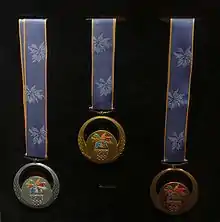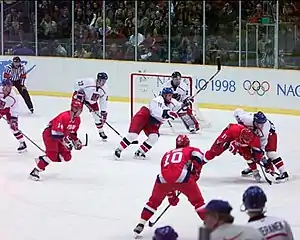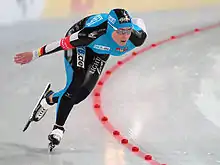1998 Winter Olympics medal table
The 1998 Winter Olympics, officially known as the XVIII Olympic Winter Games, was a winter multi-sport event held in Nagano, Japan, from 7 to 22 February 1998.[1] Twenty-four nations earned medals at these Games, and fifteen won at least one gold medal; forty-eight countries left the Olympics without winning a medal. Competitors from Germany earned the highest number of gold medals (12) and the most overall medals (29). With 10 gold medals and 25 overall medals, Norway finished second in both categories.[2] Denmark won its first – and as of 2018 only – Winter Olympics medal,[3] while Bulgaria and the Czech Republic won their first Winter Games gold medals.[4][5] Azerbaijan, Kenya, Macedonia, Uruguay, and Venezuela competed for the first time, but none of them won a medal.[6]
| Part of a series on the |

Varying statistics are reported for the number of participants at the 1998 Winter Olympics. The Sports-Reference website states that 2,180 athletes from 72 nations participated in 68 events from 14 sports and disciplines.[2] Olympic historian Bill Mallon, in his Historical Dictionary of the Olympic Movement, agrees with the figure of 2,180 participants.[7] In contrast, the International Olympic Committee (IOC) website reports that 2,176 athletes competed at the Games.[6] The sport of curling returned after a single appearance in the 1924 Olympics, snowboarding was added as a new sport, and women's ice hockey made its first appearance in the Olympics.[6]
The leading medal winner at the Games was Russian skier Larisa Lazutina, who won five medals, including three golds.[2] The only other athlete to win three gold medals was Norwegian skier Bjørn Dæhlie, who won four medals overall, making him the first Winter Olympian to win twelve career medals, eight of which were gold.[2][8] Nine other athletes won three medals, including three Germans.[2] American figure skater Tara Lipinski became the youngest competitor in Winter Olympics history to earn a gold medal in an individual event.[6]
Medal table



The medal table is based on information provided by the IOC and is consistent with IOC convention in its published medal tables. By default, the table is ordered by the number of gold medals the athletes from a nation have won; a nation is an entity represented by a National Olympic Committee. The number of silver medals is taken into consideration next and then the number of bronze medals. If nations are still tied, equal ranking is given and they are listed alphabetically.
In the two-man bobsleigh competition, a tie meant that two gold medals were awarded, so no silver medal was awarded for that event.[11] A tie for second in the men's Super G skiing competition meant that a pair of silver medals were given out, so no bronze medal was awarded for that event.[12] In the four-man bobsleigh, a tie for third resulted in the awarding of two bronze medals.[13] Due to these ties, the number of gold medals awarded was one more than the number of silver or bronze medals. In snowboarding, Canadian Ross Rebagliati won the gold medal in the men's Giant Slalom, but it was briefly stripped by the IOC after he tested positive for marijuana. After the Canadian Olympic Association filed an appeal, however, the IOC's decision was overturned.[14]
* Host nation (Japan)
| Rank | NOC | Gold | Silver | Bronze | Total |
|---|---|---|---|---|---|
| 1 | 12 | 9 | 8 | 29 | |
| 2 | 10 | 10 | 5 | 25 | |
| 3 | 9 | 6 | 3 | 18 | |
| 4 | 6 | 5 | 4 | 15 | |
| 5 | 6 | 3 | 4 | 13 | |
| 6 | 5 | 4 | 2 | 11 | |
| 7 | 5 | 1 | 4 | 10 | |
| 8 | 3 | 5 | 9 | 17 | |
| 9 | 3 | 1 | 2 | 6 | |
| 10 | 2 | 6 | 2 | 10 | |
| 11 | 2 | 4 | 6 | 12 | |
| 12 | 2 | 2 | 3 | 7 | |
| 13 | 2 | 1 | 5 | 8 | |
| 14 | 1 | 1 | 1 | 3 | |
| 15 | 1 | 0 | 0 | 1 | |
| 16 | 0 | 6 | 2 | 8 | |
| 17 | 0 | 2 | 1 | 3 | |
| 18 | 0 | 1 | 0 | 1 | |
| 0 | 1 | 0 | 1 | ||
| 20 | 0 | 0 | 2 | 2 | |
| 0 | 0 | 2 | 2 | ||
| 22 | 0 | 0 | 1 | 1 | |
| 0 | 0 | 1 | 1 | ||
| 0 | 0 | 1 | 1 | ||
| Totals (24 NOCs) | 69 | 68 | 68 | 205 | |
References
- General
- "1998 Medal Count". CNN Sports Illustrated. Archived from the original on 29 June 2011. Retrieved 14 March 2009.
- "Olympic Games: Nagano 1998 – Medal Table". International Olympic Committee. Archived from the original on 4 December 2008. Retrieved 19 May 2020.
- Kubatko, Justin. "1998 Nagano Winter Games". Olympics at Sports-Reference.com. Sports Reference LLC. Archived from the original on 25 April 2009. Retrieved 14 March 2009.
- Mallon, Bill; Heijmans, Jeroen (2011). Historical Dictionary of the Olympic Movement. Scarecrow Press. ISBN 978-0-8108-7522-7.
- Specific
- The Organizing Committee for the XVIII Olympic Winter Games, Nagano 1998 (1998). The XVIII Olympic Winter Games Official Report – Volume I (PDF). Nagano, Japan: LA84 Foundation. Retrieved 2 May 2010.
- Kubatko, Justin. "1998 Nagano Winter Games". Olympics at Sports-Reference.com. Sports Reference LLC. Archived from the original on 25 April 2009. Retrieved 19 May 2020.
- Chase, Chris (2 February 2018). "The USA hasn't won the Winter Olympic medal count in 86 years (and 21 other crazy Olympic facts)". USA Today. Archived from the original on 12 February 2018. Retrieved 14 April 2018.
- "The big chill: Heavy snow shuffles schedule; luger wins third gold". CNN Sports Illustrated. 9 February 1998. Archived from the original on 29 June 2011. Retrieved 16 March 2009.
- Druzin, Randi (23 February 1998). "The XVIII Winter Games: Ice Hockey; In Prague, 70,000 Fans Gather to Savor Moment". The New York Times. Retrieved 29 December 2010.
- "Nagano 1998". International Olympic Committee. Retrieved 12 March 2014.
- Mallon and Heijmans, p. 407.
- "Dahlie claims 12th medal; Czechs take hockey gold". Amarillo Globe-News. Associated Press. 23 February 1998. Archived from the original on 4 June 2011. Retrieved 9 July 2019.
- Clarey, Christopher (20 February 1998). "Two Gold, One Stunning Crash: Now Maier Is Fast and Familiar". The New York Times. Retrieved 17 March 2009.
- Newberry, Paul (20 February 1998). "Teammate Grabs Gold From Niemann-Stirnemann". The Washington Post. Associated Press. Archived from the original on 8 November 2012. Retrieved 17 March 2009.
- "Highs and lows: Japanese jumpers soar; Canadian curlers fumble gold". CNN Sports Illustrated. 23 February 1998. Archived from the original on 29 June 2011. Retrieved 14 March 2009.
- Clarey, Christopher (16 February 1998). "The XVIII Winter Games: Alpine Skiing; Three Days After Spectacular Crash, Maier Wins Gold". The New York Times. Retrieved 15 March 2009.
- Olson, Lisa (22 February 1998). "Tough Sledding As Medal Slips, U.S. Hits Skids". New York Daily News. Archived from the original on 13 May 2009. Retrieved 9 July 2019.
- Gross, George (21 February 2006). "Ross Rebagliati: 1998 – Nagano, Japan". Sun Media Corporation. Canadian Online Explorer. Archived from the original on 23 May 2012. Retrieved 22 March 2009.
External links
- "Nagano 1998". Olympic.org. International Olympic Committee.